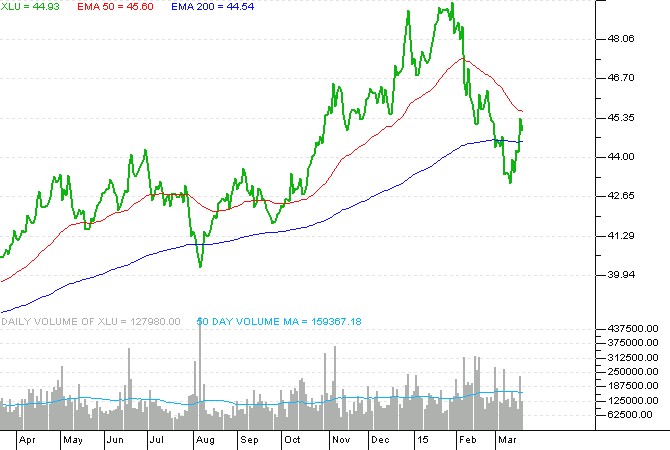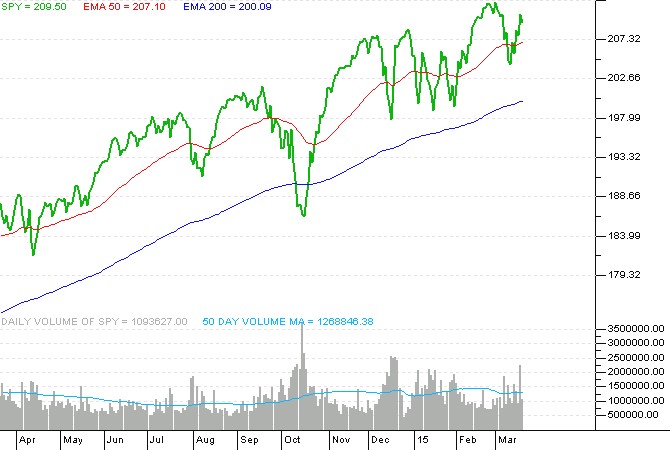3 Defensive Equity ETFs For Turbulent Times
Post on: 28 Март, 2015 No Comment

Summary
- Conservative equity strategies may become more important with additional market volatility.
- ETFs offer a diversified way to access core low volatility themes with the potential for capital appreciation as well.
- Balanced ETFs are another alternative when the market gets turbulent.
Investors that are concerned about the recent volatility in the stock market may want to consider looking at conservative equity strategies to protect their assets. There are a number of ETFs that have proven to be dual-purpose vehicles for steady capital appreciation and income despite the turmoil in high beta sectors.
Rather than completely pulling back your portfolio exposure to fixed-income or cash, you can reposition your equity sleeve to more defensive areas that still offer compelling growth opportunities.
One under the radar exchange-traded fund that has had a very strong start to the year is the Guggenheim Defensive Equity ETF (NYSEARCA:DEF ). This ETF is made up of 100 global stocks that constitute the Sabrient Defensive Equity Index, which provides exposure to market sectors that have historically performed well in down markets.
So far this year, DEF has gained 6.32% and recently hit a new all-time high this week. It’s also worth noting that DEF has gained in every subsequent year since 2008 where it lost 30.42%. Currently this fund has over $130 million positioned in energy, utilities, and telecommunications, which combined make up over 55% of the total portfolio.
One of the things I like about DEF is that the underlying holdings are well diversified to help weather volatility while still providing plentiful opportunity for capital appreciation in an up market. The net expense ratio of this ETF is currently listed at 0.65%.

Another ETF that has long been a favorite of mine for reducing draw down is the iShares MSCI USA Minimum Volatility ETF (NYSEARCA:USMV ). This fund provides exposure to 139 large and mid-cap stocks in the United States that are selected based on a screen of the lowest price fluctuations among their peers. This strategy essentially seeks to minimize the peaks and valleys associated with traditional stock market indices.
The top sector weightings in USMV include healthcare, consumer staples, and technology firms. This portfolio mix has helped push USMV to a gain of 3.00% so far in 2014 and as you can see on the chart the uptrend is still firmly intact.
Another advantage of this strategy is the rock bottom expense ratio of just 0.15% that makes this ETF perfect for a core equity holding. The one drawback of USMV is that you won’t experience as much upside in a rapidly rising environment; however conservative investors may be willing to forego that opportunity to mitigate downside risk .
The last fund on my watch list with a defensive tilt is the iShares Growth Allocation ETF (NYSEARCA:AOR ). This ETF is a fund of funds that incorporates other iShares equity and bond ETFs in its asset allocation strategy. The current makeup is tilted 65% stocks and 35% bonds, which makes it more of a balanced offering.
The advantage of the bonds in the portfolio is that they can often function as a shock absorber to cushion equity volatility. However, it still has just enough domestic and international stock exposure to warrant upside opportunity during bullish cycles.
The net expense ratio of this ETF is just 0.30% and iShares lists the beta to the S&P 500 at 0.69. This means that you will essentially capture 70% of the upside in stocks based on the current underlying holdings.
Each of these funds can be used as core holdings or tactical opportunities depending on your current portfolio positioning. While they are not designed to completely eliminate the risk of declining stock prices, they should give you a measured dampening effect when volatility rears its ugly head. In addition, they have the opportunity to still participate in a rising stock environment during growth phases.
Disclosure: I am long USMV. I wrote this article myself, and it expresses my own opinions. I am not receiving compensation for it. I have no business relationship with any company whose stock is mentioned in this article.
Additional disclosure: David Fabian, FMD Capital Management, and/or clients may hold positions in the ETFs and mutual funds mentioned above. The commentary does not constitute individualized investment advice. The opinions offered herein are not personalized recommendations to buy, sell, or hold securities.














